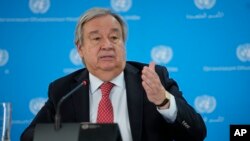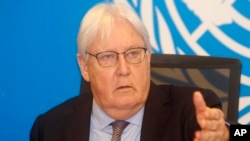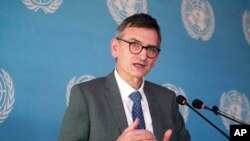U.N. Secretary-General Antonio Guterres appealed Wednesday for an end to the fighting in Sudan and international support for the Sudanese people, who he said are facing a humanitarian catastrophe.
“Aid must be allowed into Sudan, and we need secure and immediate access to be able to distribute it to people who need it most,” Guterres said during a news conference in Nairobi, Kenya. “Civilians and civilian infrastructure must be protected, and humanitarian workers and their assets must be respected.”
Sudan’s Health Ministry says over 500 people have been killed and nearly 5,000 wounded since the fighting began on April 15, during a power struggle between the leaders of the Sudanese government forces and the paramilitary Rapid Support Forces.
The U.N.'s International Organization for Migration said this week that at least 334,000 people have been internally displaced by the fighting, in addition to the 100,000 who have fled the country. The agency has warned the fighting could cause more than 800,000 people to flee the northeastern African country.
Many are going to the seven countries that border Sudan, including Chad, South Sudan, the Central African Republic, Egypt and Ethiopia.
Latest cease-fire efforts
South Sudan’s Foreign Ministry announced Tuesday that Sudanese army chief General Abdel Fattah al-Burhan and General Mohamed Hamdan Dagalo, head of the paramilitary Rapid Support Forces, have agreed to a new weeklong cease-fire that will take effect Thursday.
The U.N. chief expressed concern that previous cease-fires have consistently been violated, and he urged the international community to press the two generals to respect and implement the latest one.
South Sudanese President Salva Kiir stressed the importance of a longer truce and the naming of envoys to peace talks, to which both sides agreed.
Egyptian President Abdel Fattah el-Sisi said his government would support talks in Sudan between the rival factions, adding he was "being careful about not interfering in their domestic matters."
"The entire region could be affected," he said in an interview Tuesday with a Japanese newspaper, as an envoy from Sudan's army chief met with Egyptian officials in Cairo.
Humanitarian operation
U.N. humanitarian chief Martin Griffiths spent Wednesday in Port Sudan, the Sudanese Red Sea city to which the U.N. and many nongovernmental organizations have shifted their operations from Khartoum.
Griffiths and the head of the U.N. in Sudan, Volker Perthes, spoke by phone with al-Burhan and Dagalo.
Griffiths told reporters he is working on getting commitments from the two factions to protect humanitarian assistance and allow aid workers and supplies to move, even when there is no formal cease-fire.
“We will need to have agreements at the highest level and very publicly, and we will need to deliver those commitments into local arrangements that can be depended on,” he said, emphasizing that the humanitarian community is “staying and delivering.”
Most aid operations have been suspended or severely scaled back because of the insecurity. Several aid workers have been killed in the fighting. The Norwegian Refugee Council said Wednesday that one of its Sudanese volunteers was killed Sunday in the volatile city of Geneina in West Darfur.
Looting also has hampered aid operations.
The World Food Program said Wednesday that nearly 17,000 tons of food had been stolen from its warehouses across Sudan, and it was working to determine what supplies remain. Before the fighting, WFP had more than 80,000 tons of stocks in the country. The agency still plans to provide food assistance for 384,000 people in the coming days.
The U.N. refugee agency’s Darfur coordinator said looting has long been a problem in Darfur, and many of their facilities have been robbed since April 15.
“Our facilities in Nyala, in South Darfur, and in El Geneina, in West Darfur, have been targeted by looters, criminals, bandits, out-of-control militias,” Toby Harward told reporters in a video call from Nairobi, to which he was evacuated last week.
He said local authorities in Darfur have been working with humanitarians to try to make sure the various national cease-fires are respected at the local level, so aid can be distributed.
Diplomacy efforts
Perthes, the top U.N. official in Sudan, told The Associated Press on Monday that Sudan's warring generals have agreed to send representatives potentially to Saudi Arabia for negotiations.
Mohamed Abdalla Idris, the Sudanese ambassador to the United States, told VOA he hopes the cease-fire eventually will lead to meaningful long-term peace talks.
He said, “a cease-fire, truce, is a two-way traffic,” and noted peace can be realized only if all parties respect the terms of any deal.
The fighting in Sudan has forced foreign governments to evacuate their citizens from the country.
Russia’s military announced Tuesday that more than 200 people will be evacuated on four military transports.
The U.S. State Department said Monday that more than 1,000 U.S. citizens have been evacuated since the violence started.
Michael Atit in Khartoum, Anthony LaBruto, John Tanza and Nike Ching at the State Department contributed to this report. Some information came from The Associated Press, Reuters and Agence France-Presse.






